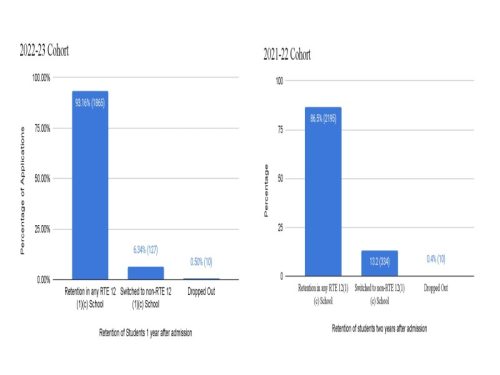Indus Action launches the 2024 RTE Retention Survey
Indus Action, in collaboration with Georgetown University, USA, MIDP (Masters in International Development Policy) students, recently announced the launch of the 2024 RTE Retention Survey.
Conducted across Chhattisgarh, Uttarakhand, and Odisha, the survey aims to enhance understanding of retention rates and social inclusion of children admitted in schools under RTE 12(1)(c).
This new survey by NGO Indus Action, that enables the implementation of the Right to Education, examines child retention and discrimination among two RTE student cohorts: 2021-22 and 2022-23. It tracks drop-out trends, compares retention rates cross-sectionally, and assesses social and financial discrimination, enabling longitudinal and cross-sectional analysis over multiple years.
The rapid expansion of private schools has significantly transformed India’s educational landscape. 45 percent of primary students are now enrolled in private institutions, compared to 19 percent in other low and middle-income countries. This growth has created an “active educational marketplace,” even in rural areas. However, it has also led to de facto segregation due to varying school fees and selective admissions.
India passed the Right to Education Act of 2009 to promote educational equality and social inclusion. This act aims to promote equality by ensuring free, compulsory education for grades 1-8 and mandating that private unaided schools reserve 25 percent of seats for economically weaker and disadvantaged children.
Comments Tarun Cherukuri, co-founder and CEO, Indus Action, “Our mission is clear: every family in India earning less than Rs. 10,000 ($135) monthly should have full access to welfare entitlements for quality education, health, and livelihoods. With 890 million citizens below the poverty line and over 500 schemes often failing to deliver impactful results, one of our key focus points is the execution and implementation of the Right to Education.
Recognising a significant gap in research on the retention and social inclusion of children admitted under the Right to Education (RTE) Act 12(1)(c), IA has been investigating these issues since 2017.
This study aims to assess the effectiveness of this provision and the suitability of private schools for disadvantaged children. To fully understand the lived experiences of these students, it is imperative to conduct qualitative research. This approach will provide deeper insights into the educational status and the challenges these students face, thus allowing for a more comprehensive evaluation of the provision’s impact.
The key findings of the 2024 RTE Retention Survey are as follows:
● Retention Rates:
– 2022-23 cohort: 93.2 percent retention rate
– 2021-22 cohort: 86.5 percent retention rate
– Girls show higher retention than boys in the 2021-22 cohort (92.8 percent vs. 81.8 percent), but they are nearly equal in the 2022-23 cohort (93.4 percent vs. 92.9 percent).
● Response Rates:
– Overall: 67 percent
– The 2021-22 cohort had a higher percentage (73 percent) than the 2022-23 cohort (61 percent).
– State-wise for 2021-22: Chhattisgarh (74 percent), Uttarakhand (73 percent), Odisha (58 percent).
– State-wise for 2022-23: Uttarakhand (66 percent), Chhattisgarh (63 percent), Odisha (54 percent).
● Dropout and School Switching:
– Dropout rate: 0.5 percent for both cohorts.
– Switching schools: Higher in the 2021-22 cohort (13.2 percent) vs. the 2022-23 cohort (6.3 percent).
– Students switched to government, private aided, and private unaided schools equally.
● Financial Status:
– 45 percent of the 2021-22 cohort and 48 percent of the 2022-23 cohort have siblings in private schools, not via RTE 12(1)(c).
– 22 percent of parents in the 2022-23 cohort pay school-related fees; 46 percent are uncomfortable with these fees.
● Category of Application:
– ST applicants had the lowest retention rates: 78.3 percent (2021-22) and 86 percent (2022-23).
● Social and Financial Discrimination:
– Most parents (more than 90 percent) do not report explicit social discrimination against children.
– 95.7 percent of parents agree that children enjoy school, 93.3 percent say that teachers pay attention, and 98.5 percent report positive peer experiences.
● Parental Engagement:
– 55.1 percent engage with teachers monthly, 26.6 percent more than once a month.
– 94.1 percent agree teachers inquire about absenteeism.
– 95.4 percent agree children have friends from wealthier households
Conducted from March to April 2024, the survey encompassed 4,540 parents and guardians, stratified by state and gender, with a response rate of 67 percent. Retention rates were 93.2 percent for the 2022-23 cohort and 86.5 percent for the 2021-22 cohort, with a dropout rate of 0.5 percent for both cohorts.
Mithlesh Mishra, Director Primary Education, Bihar says, “Regarding the status of RTE in implementation in the state of Bihar, I am very thankful that participants from Indus Action are working here. The team has visited many times, and this time, we have taken admission through online randomisation. We are hopeful that this number will increase as transparency has tremendously improved, and parents, teachers, and private school associations are very happy with this development.
I welcome team Indus Action’s study on the status of retention and the areas of improvement where we can improve student intake and retention.”
Indus Action is a policy implementation organisation that works towards ensuring that policies designed to transform the social fabric of the country are fully realised. To learn more, visit https://www.indusaction.org/about-us/.
















Add comment